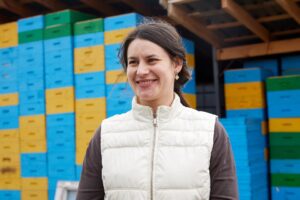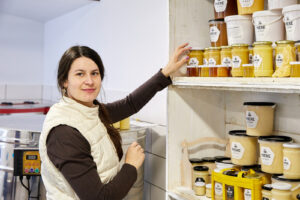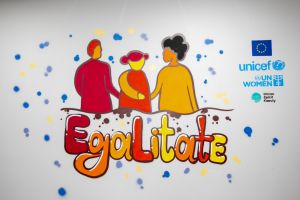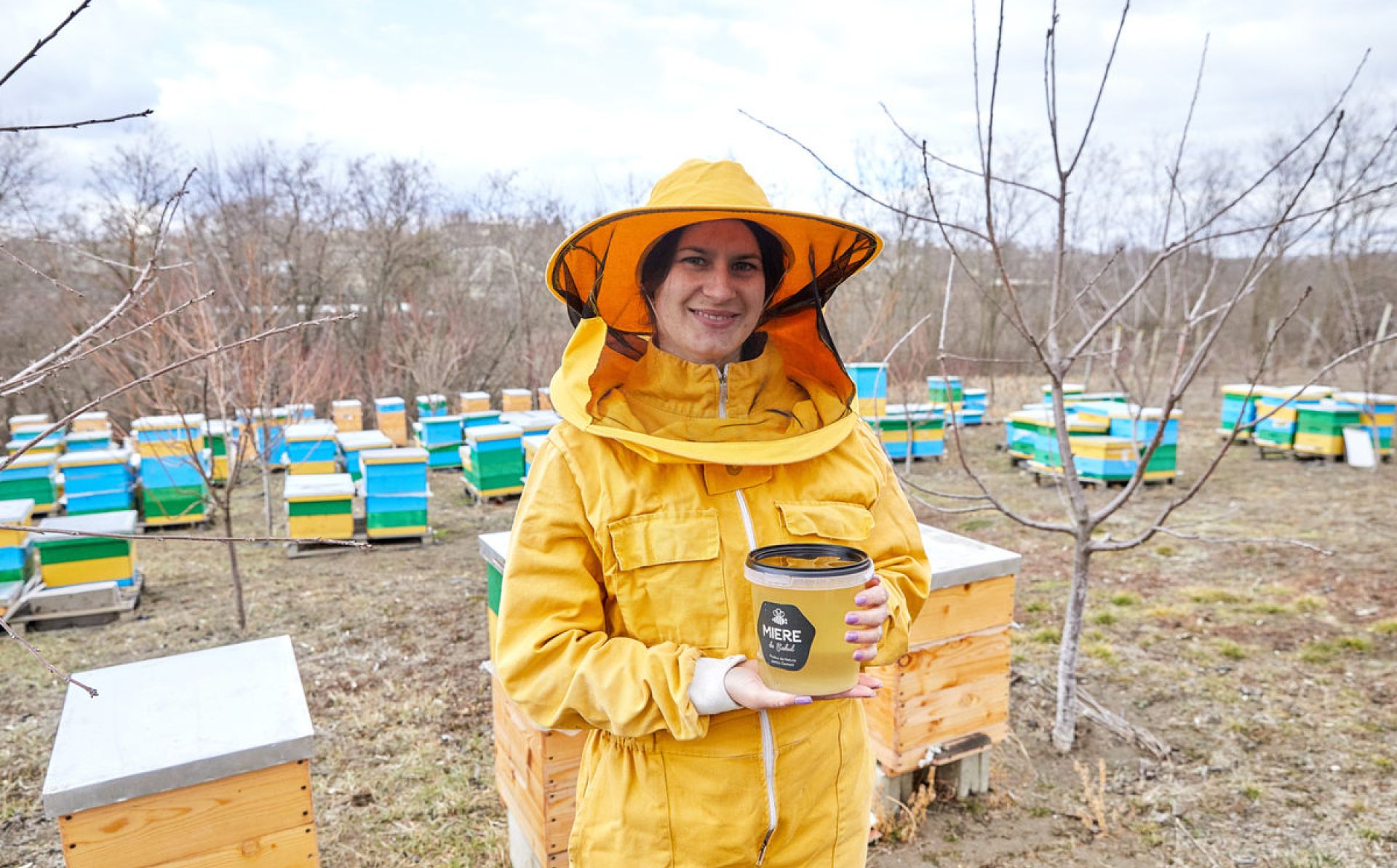
The women who tamed the bees: how to develop business in a traditionally male area
Until recently, it was rare to see a woman among the beekeepers, but now the number of apiaries kept by women is on the rise. Women have managed to ‘tame’ the bees and gradually overcome the stereotypes. Nevertheless, only 8% of the 7,696 apiaries included in the National Food Safety Agency’s (NFSA) National Register of Beekeepers are kept by women.
The apiaries belonging to Liza Mămăliga from Todirești village, Ungheni, and to Cristina Bacaliuc, from Andrușul de Jos village, Cahul, are part of the 8%. Both beekeepers are energetic, curious and fascinated by bees and their work.
Croutons rolled in honey
Elizaveta Mămăliga is 33 years old, she is a young mother and businesswoman, who has worked hard to build herself a wonderful future in her home village. Liza – as her family members and friends call her – never stops and seems to have learned this from the bees that she keeps. She wakes up at the break of dawn, makes a cup of tea from flowers she picks in the garden and makes the plan for the day – order and close involvement in the work are vital to the success of any business, the young woman believes.
After finishing her studies, Liza started to look for a job. She couldn’t imagine sitting for hours in a bank, working at a desk. She wanted to try to create something new, but what exactly? A scholarship in Germany caught her attention. Young people from all over the world had the possibility to learn from renowned experts how to start their own businesses.
Bees were the first thing she thought about. She had lived her whole life among bees and hives. Her best childhood memories were related to them, when neighbours’ children would visit her, and her father gave them a plate of honeycomb. She recalled how tasty the croutons rolled in fresh acacia honey were, or how they used to hide behind the colourful beehives in the apiary by the forest.
This is how the small family business started up. “It was in 2012. At that time, you would see only older men at the beekeepers’ meetings or fairs. No one would take you seriously. I was young and I was a beekeeper. They thought I had bought the honey and that I was trying to sell it, but their lack of trust motivated me even more to continue learning. I want to bring beekeeping to an even higher level and to have more young people involved in this kind of work,” admits Liza and a cheeky grin lights up her face.
‘Beekeeping is a challenge’
She managed to reach her goal over the years. Now she has around 80 beehives and she produces natural nutritional bars made with hazelnut, plums, and other vitamin-rich fruit, which are popular and appreciated on the European Union market.
She also produces her own propolis tincture, beeswax candles and tea made of plants she grows in her own garden. “I love trying new things. I want to test my ideas,” laughs Liza, while putting on her suit and picking up the bee smoker, which she uses to calm bees down. It’s time she paid them a visit and made sure they were well and not missing anything.
“I like to spend time in nature. When I work with the bees I can feel all seasons, all flowers, meadows; I feel connected to nature. Beekeeping feels like a challenge – many issues to solve, decisions to make and sometimes this has to be done in the blink of an eye. There’s no time to get bored, and every year feels different,” confesses Liza.
She aims at promoting local products, which are natural and as little processed as possible. “I want us to develop new product ideas, to bring money into the local economy, to create jobs, to do the work we like. Bees, as we know, are very important for biodiversity, for pollination, for organic farming. We want everything we do to have a positive impact, we don’t want to make any compromises that would harm the environment,” adds Liza as the sun breaks through the heavy clouds and starts to warm up the yellow and blue hives scattered by the woodland edge.
‘I always keep an eye on the weather forecast’
It is a single-storey house. You can hear the soft humming of the device that transforms the honey into an airy homogenous cream, enriched with cinnamon and ginger. Cristina bends over the huge stainless steel bowl, watching every rotation. This is her new laboratory, where she creates special products out of the honey she harvests in her apiary.
Cristina Bacaliuc is from Andrușul de Jos village, Cahul, and she too is a beekeeper. In 2014, she started to care for two beehives and now they have reached 300.
“My husband studied beekeeping and shared with me various interesting facts about bees, how each of them has a role that they play regardless of what happens. I was bewitched and I said I wanted to come and help him. Then I never wanted to leave. I like to hear them buzzing. It calms you, and we work really well together [with the bees],” laughs Cristina, letting the honey flow slowly into a jar. She takes a little honey with a wooden stick and tastes it. She explains it is important for it to be creamy and to melt immediately on the tip of your tongue, and then she turns on the stirring mechanism again.
“In summer, I wake up and go to bed in the same pace as bees do. I always keep an eye on the weather forecast. I know at what time the sun rises, what direction the wind blows, when it is going to rain and when it is going to be nice… I like best the day when the honey is harvested, because that’s when we see the result of our year-long work,” says Cristina.
She is not looking for easy ways and makes a lot of effort so that beekeeping will turn into a long-lasting family business, which her three sons, who for now are running among the beehives, might one day like to take over.
This article has been developed as part of the EVA project ‘Strengthened Gender Action in Cahul and Ungheni districts’, funded by the European Union and implemented by UN Women in partnership with UNICEF.
MOST READ
RELATED PROJECTS
SEE ALSO

No, time is not on Russia‘s side

How to open an art business in Moldova: the experience of Alexandra Mihalaș

Be one step ahead of a hacker: check simple cybersecurity tips!

How to act and move on: strategies for women facing discrimination and online harassment
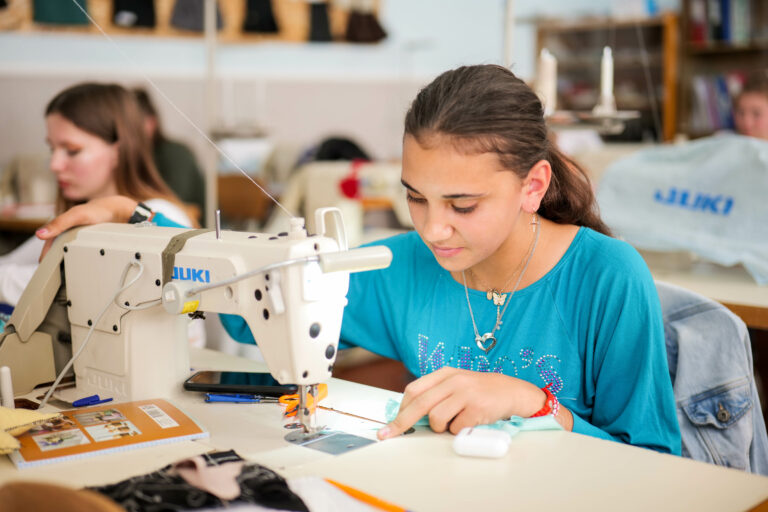
‘Learning is not a process but a journey’: the example of a school in Orhei
More campaign pages:
Interested in the latest news and opportunities?
This website is managed by the EU-funded Regional Communication Programme for the Eastern Neighbourhood ('EU NEIGHBOURS east’), which complements and supports the communication of the Delegations of the European Union in the Eastern partner countries, and works under the guidance of the European Commission’s Directorate-General for Neighbourhood Policy and Enlargement Negotiations, and the European External Action Service. EU NEIGHBOURS east is implemented by a GOPA PACE-led consortium. It is part of the larger Neighbourhood Communication Programme (2020-2024) for the EU's Eastern and Southern Neighbourhood, which also includes 'EU NEIGHBOURS south’ project that runs the EU Neighbours portal.

The information on this site is subject to a Disclaimer and Protection of personal data. © European Union,








